- Science students want humanities classes. Many of them are fantastic writers and deep thinkers, and they are hungry for intellectual content that brings meaning to the science and medicine they’ve chosen to study.
- Make connections with advising staff and help them see the differences that the program is making for their students. They may become your biggest advocates.
- Build on what is already available to you. Look at the things that are already happening and figure out how to connect the dots into a coherent whole. Creating a new program doesn’t always demand extensive resources.
- A program doesn’t have to be perfect to benefit students. Programs can evolve and grow over time.
University of Arkansas Medical Humanities Minor

Since 2019, the University of Arkansas has offered a minor in the Medical Humanities (MEDH). The idea for the program originated when Casey Kayser was hired in the English department in 2012 to develop a service learning medical humanities course for pre-medical students. Kayser––who at the time was not yet a tenure-track faculty member––found that pre-med students were hungry for humanities material. After doing some research on medical humanities programs, she reached out to Trish Starks in History, who had been teaching medical humanities courses since 2010. Together, they connected with colleagues in anthropology and philosophy and developed an interdisciplinary steering committee for what would eventually become the minor in medical humanities.
The structure of the 18-credit program is relatively straightforward and draws on many courses that were already on the books in various departments. To preserve the interdisciplinary nature of the program, no more than two classes may be from any one department. Students are required to complete:
- An introductory course from a list of possibilities, such as Introduction to Anthropology, Introduction to Gender Studies, Introduction to Ethics, or General Sociology or Psychology.
- Three core courses from at least two departments. Examples include Medical Anthropology, History of Race and Medicine, Bioethics, On Death and Dying, and Multicultural Health.
- Two elective courses on topics such as Ethics and the Professions, Body and Identity, and Intercultural Communication.
The program is able to capitalize in particular on the presence of the Honors College, in which pre-med students are often enrolled. The Honors College allows them the flexibility of offering signature seminars on special topics, often co-taught by faculty from different disciplines.
The minor has grown rapidly over the course of five years. As of Spring 2024, there are 334 MEDH minors, making it the fifth largest minor at the University of Arkansas and the second largest in the College of Arts and Sciences. This is due in part to advising, as both pre-med and nursing advisors have observed how much more well-prepared MEDH students are compared to their colleagues. Pre-med students with a MEDH minor tend to perform better on their medical school interviews and are also more successful at applying for prestigious fellowships, such as Fulbrights. Moreover, research has shown that medical students’ empathy scores correlate strongly with patient experience, but that their sense of empathy tends to degrade over time; as of yet, no one has tested how to increase empathy at the pre-med level, but both faculty and advisors hope that programs like MEDH might eventually be part of a solution to that problem.
The MEDH program has also had an impact beyond the typical population of undergraduate students. In the summer of 2022, Kayser and Starks co-taught a National Endowment for the Humanities Summer Teaching Institute about pandemics in history and literature for a group of K-12 teachers. The seminar drew on their experiences teaching in the medical humanities program, but with a very different population of students––one that had faced significant challenges of their own throughout the pandemic. The seminar became a place of catharsis as well as intellectual exchange. Starks notes that she learned new methods for teaching, especially centered around traumatic events, and gained greater understanding of her current and upcoming undergraduate students. But it was primarily the affective experience of the seminar that stayed with them and fed back into the minor. Starks began incorporating techniques such as reactive writing into her courses, while Kayser began to include more art and images from historic public health campaigns.
In the future, Kayser says, they would like to develop a shared introductory course. Although she continues to teach her original Introduction to Medical Humanities Seminar, its enrollment remains restricted to pre-med students. MEDH would benefit from a course that all minors take. They would also like to survey students to see if there is any interest in an MEDH major, and find ways to make cluster hires to increase the number of faculty who teach in the program. The success of the program is beginning to have an impact on hiring, as some departments specify medical humanities as an area of interest. They are also exploring how to expand the program into continuing education for medical professionals and work with other campuses to establish a multi-institutional program that would benefit medical students at the University of Arkansas for Medical Sciences (UAMS) campus located in Little Rock, and at the UAMS Northwest campus, which has recently started admitting select medical students to complete their medical degree in Fayetteville.

